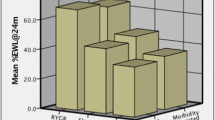Abstract
Objective
Despite following international guidelines and conducting routine preoperative dietary counseling, every bariatric surgeon will encounter technical challenges in laparoscopic gastric bypass surgery. We present a series of patients in whom the bariatric procedure was stopped after encountering insufficient exposure during diagnostic laparoscopy. These patients were sent back for dietary counseling and underwent surgery after conservative weight loss. The data from this two-step procedure are analyzed and discussed.
Methods
This concept was applied and studied in 14 patients from a series of 620 bariatric procedures. Patients who underwent a primary laparoscopic gastric bypass (n = 593) were used as references.
Results
The patients in the study group were significantly heavier than those in the reference group (165 vs. 127 kg, p < 0.001), with 79 % having a BMI >50 kg/m2. The patients lost a median of 11 kg after 2 months of conservative treatment, and the mean BMI decreased from 55.7 to 52.6 kg/m2. All the patients in the study group underwent laparoscopic surgery for the second procedure with no need for conversion. The complication rate was not elevated in the study group. Overall hospital costs were higher for the study group compared with those for the primary laparoscopic bypass group (27,136 vs. 19,601 USD, p = 0.034).
Conclusion
The primary laparoscopic procedure can be stopped in patients with insufficient exposure instead of having them undergo conversion to open surgery. These patients may undergo successful laparoscopic procedures after conservative weight loss with no increased risk and with all of the possible benefits of a laparoscopic approach. As a result of this study, we have established a fixed, preoperative lower limit of 10 % excess weight reduction before accepting superobese patients (BMI >50 kg/m2) for surgery at our hospital.

Similar content being viewed by others
References
Guidelines for reporting results in bariatric surgery. Standards Committee, American Society for Bariatric Surgery. Obes Surg. 1997; 7(6):521–2.
Stenberg E, Szabo E, Agren G, Naslund E, Boman L, Bylund A et al (2014) Early complications after laparoscopic gastric bypass surgery: results from the Scandinavian Obesity Surgery Registry. Ann Surg 260(6):1040–7
Sanchez-Santos R, Vilarrasa N, Pujol J, Moreno P, Manuel Francos J, Rafecas A et al (2006) Is Roux-en-Y gastric bypass adequate in the super-obese? Obes Surg 16(4):478–83
Flum DR, Belle SH, King WC, Wahed AS, Berk P, Chapman W et al (2009) Perioperative safety in the longitudinal assessment of bariatric surgery. N Engl J Med 361(5):445–54
Schwartz ML, Drew RL, Chazin-Caldie M (2004) Factors determining conversion from laparoscopic to open Roux-en-Y gastric bypass. Obes Surg 14(9):1193–7
Fris RJ (2004) Preoperative low energy diet diminishes liver size. Obes Surg 14(9):1165–70
Gonzalez-Perez J, Sanchez-Leenheer S, Delgado AR, Gonzalez-Vargas L, Diaz-Zamudio M, Montejo G et al (2013) Clinical impact of a 6-week preoperative very low calorie diet on body weight and liver size in morbidly obese patients. Obes Surg 23(10):1624–31
Anderin C, Gustafsson UO, Heijbel N, Thorell A (2015) Weight loss before bariatric surgery and postoperative complications: data from the Scandinavian Obesity Registry (SOReg). Ann Surg 261(5):909–13
Gerber P, Anderin C, Thorell A (2015) Weight loss prior to bariatric surgery: an updated review of the literature. Scand J Surg: SJS 104(1):33–9
Wittgrove AC, Clark GW, Tremblay LJ (1994) Laparoscopic gastric bypass, Roux-en-Y: preliminary report of five cases. Obes Surg 4(4):353–7
Dindo D, Demartines N, Clavien PA (2004) Classification of surgical complications: a new proposal with evaluation in a cohort of 6336 patients and results of a survey. Ann Surg 240(2):205–13
Nguyen NT, Rivers R, Wolfe BM (2003) Factors associated with operative outcomes in laparoscopic gastric bypass. J Am Coll Surg 197(4):548–55, Discussion 55–7
Kakarla VR, Nandipati K, Lalla M, Castro A, Merola S (2011) Are laparoscopic bariatric procedures safe in superobese (BMI >/=50 kg/m2) patients? An NSQIP data analysis. Surg Obes Relat Dis 7(4):452–8
Buchwald H, Estok R, Fahrbach K, Banel D, Sledge I (2007) Trends in mortality in bariatric surgery: a systematic review and meta-analysis. Surgery 142(4):621–32, Discussion 32–5
Gagner M, Gumbs AA, Milone L, Yung E, Goldenberg L, Pomp A (2008) Laparoscopic sleeve gastrectomy for the super-super-obese (body mass index >60 kg/m(2)). Surg Today 38(5):399–403
Eid GM, Brethauer S, Mattar SG, Titchner RL, Gourash W, Schauer PR (2012) Laparoscopic sleeve gastrectomy for super obese patients: forty-eight percent excess weight loss after 6 to 8 years with 93% follow-up. Ann Surg 256(2):262–5
Vonlanthen R, Slankamenac K, Breitenstein S, Puhan MA, Muller MK, Hahnloser D et al (2011) The impact of complications on costs of major surgical procedures: a cost analysis of 1200 patients. Ann Surg 254(6):907–13
Alami RS, Morton JM, Schuster R, Lie J, Sanchez BR, Peters A et al (2007) Is there a benefit to preoperative weight loss in gastric bypass patients? A prospective randomized trial. Surg Obes Relat Dis 3(2):141–5, discussion 5–6
Author information
Authors and Affiliations
Corresponding author
Ethics declarations
Conflict of interest
The authors declare that they have no conflict of interest.
Ethical approval
All procedures performed in studies involving human participants were in accordance with the ethical standards of the institutional research committee and with the 1964 Helsinki declaration and its later amendments or comparable ethical standards. For this type of retrospective study formal consent is not required.
Informed consent
Informed consent was obtained from all individual participants included in the study.
Additional information
Hella Scotland and Jeannette D. Widmer contributed equally to this work.
Rights and permissions
About this article
Cite this article
Scotland, H., Widmer, J.D., Wildi, S. et al. How to cope with insufficient pneumoperitoneum and exposure when performing laparoscopic gastric bypass surgery. Langenbecks Arch Surg 401, 299–305 (2016). https://doi.org/10.1007/s00423-016-1379-2
Received:
Accepted:
Published:
Issue Date:
DOI: https://doi.org/10.1007/s00423-016-1379-2




